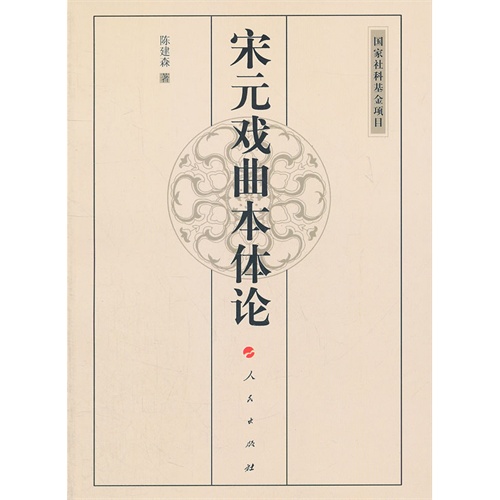Drama Ontology of the Song and Yuan Dynasties

In his book Drama Ontology of Song and Yuan Dynasties, Chen Jiansen, a drama director and professor at the Chinese Department of the School of Chinese and Literature at South China Normal University, explains that a key distinguishing element in Chinese drama during the tenth through fourteenth centuries was its reliance on performers’ presentation of both first-person narrative and third-person narrative, and breaking the fourth wall to present a story. This differs from the exclusively first-person narrative drama which preceded it, in that dramatists were ample to employ less descriptive style and emphasize other elements.
Chinese traditional drama is a comprehensive art form. Performers exhibit three fundamental skills: singing, dancing, and spoken performance. A number of factors go into a production, including the dramatists, script, actors, theater, audience, stages, scenes, settings and lighting. Its complexity is beyond any other major form of Chinese literature. In Origin of Drama, Wang Guowei (1877-1927), a famous Chinese scholar, writer and poet, defined drama performers as storytellers who sing and dance. Wang elaborated upon his definition in History of Drama in Song and Yuan Dynasties, including the utilization of languages, actions and songs to tell a story.
Where Wang’s definition left off, Chen Jiansen’s Drama Ontology of Song and Yuan Dynasties which is published by People’s Publishing House picks up, setting a broad net in its topical range and in the depth of its analysis. Chen recovers the socio-cultural environment of the Song and Yuan dynasties, and analyzes the meaning, function and patterns of discourse and performers’ status. Ultimately, the objectives of this book are straightforward: to discover what Song and Yuan drama is, how it is performed and why the drama is performed in this way.
Within the text, Chen Jiansen elaborates that Song and Yuan drama performers had a triple identity: actor, role player and character in the drama. Song and Yuan drama performers not only performed and told stories, but also interacted with the audiences. Wu Sheng, professor of the School of Humanities at Guangzhou University, agreed that Chen paid attention to the production of drama and its final form in the theater, which diverged from Wang Guowei’s studies.
Perhaps the main contribution of Drama Ontology of Song and Yuan Dynasties is its proposal of the theory of communication context in the theater. Put simply, the theory proposes that the text of a drama script is the medium for communication between theaters, and that aesthetic interaction among dramatists, narrators and audiences is the essence of communicating in the theater. Under this theory, the establishment of the system of communication context in the theater is implicit in the birth of Song and Yuan drama.
Wu praised Chen’s work for transcending the limitations of Wang’s 19th century work, which he noted were short primarily in their lack of describing the performance methods of Song and Yuan and the reasons behind these performance methods. “Drama Ontology of Song and Yuan Dynasties has inspired us by demonstrating that there is no innate difference between research methods that will a priori determine the success of a study. Rather, choosing an appropriate method is entirely dependent on the subject on wishes to research,” Wang commented. “The study of Chinese traditional literature emphasized references and allusions instead of ontology. This was an outgrowth of putting greater weight on history than literature. Even biographies in The Historical Records strive for a literary, aesthetically appealing and readable rendition; reflecting on this we should be concerned about the present state of literary studies, and channel our own energies into changing the field.”
The Chinese version appeared in Chinese Social Sciences Today, Apr. 8, 2013
Translated by Zhang Mengying
